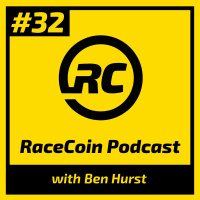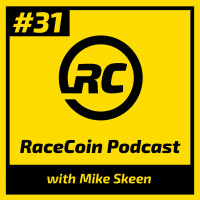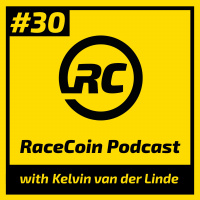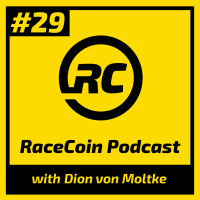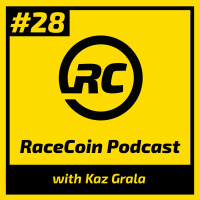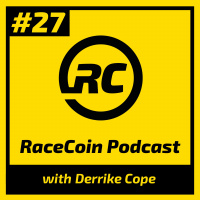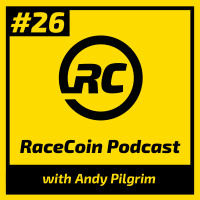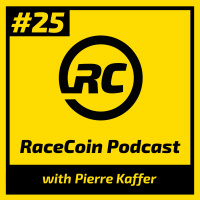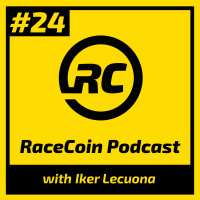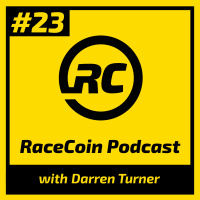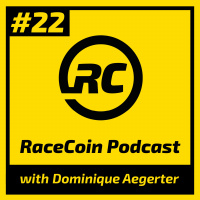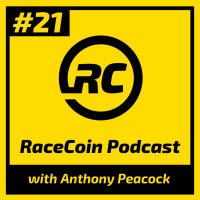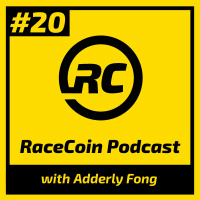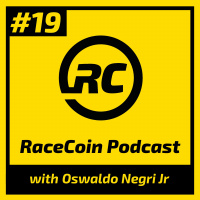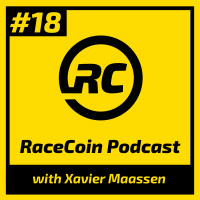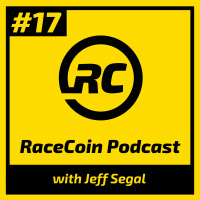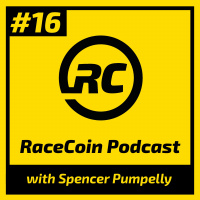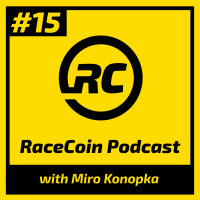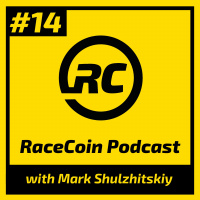Synopsis
At RaceCoin, we are passionate about what we do - and we are just as curious about the professionals as you are. The world of motorsport is fascinating, yet the top level often seems to be beyond reach. Who are the people behind the helmet? Take a look behind the scenes with the RaceCoin Podcast!
Episodes
-
#33 Sabine Schmitz - Top Gear presenter shares her journey after winning Nürburgring
23/09/2019 Duration: 13minHost: Jai Shukla & Guest: Sabine Schmitz Q1 — How was childhood like growing up? When the weather is good, Sabine Schmitz raced alongside her sisters leveraging on some nice collection of cars like 918 Porshe. They had a healthy rivalry as the practices some times without Sabine's knowledge so has to beat me on certain days. Q2 — From my conversations with other racing drivers, the career path of the male racing driver is slightly different from that of the female. Do you think that’s still a thing in the industry today? When Sabine Schmitz started motor racing, this was tough. At the moment, there is a big change as they have many good female drivers. We have a ladies team, we have lady mechanics and things are going well. This is a stark contrast to the time when Women (in South Africa) are not allowed to even vote. Q3 — So how did you make yourself known in the industry and get the opportunities that you did? When Sabine Schmitz started racing, it was not so popular for women to go racing. But she
-
#32 Ben Hurst - 3 tips: Get a notebook, hardwork and never give up
03/09/2019 Duration: 24minHost: Jai Shukla & Guest: Ben Hurst Q1 — How did it all begin in Oakville, all the way to Canada, and now you're the British GT? The dad of Ben Hurst stirred up the whole process when he took him to Bridgestone racing Academy to try out for a racing license. Ben Hurst got started in Formula Ford, here in Canada. He met one of the teams when he was at racing school there to get his racing license because Ben was just interested in trying. They eventually then won the championship after 3 years of persistence. The team he was with In the UK got partnered with an F3 team during the Formula Ford festival of friends. So that's kind of how Ben got introduced to everyone quickly in the UK. And that's kind of how all his opportunities came out. So it's kind of in one meeting after the next. Q2 — You started off racing at age 16, did that affect how you saw the races approach the races? Yes, especially in F3 you have to be willing to either go into that corner and either crashed your car into someone else or if
-
#31 Mike Skeen - A reality TV star making a name for himself in racing
26/08/2019 Duration: 22minHost: Jai Shukla & Guest: Mike Skeen Q1 — So, what was it that got you into racing? You could say that it was his father’s love for cars that had him set up for success. Together, they’d work on cars until he was old enough to get into the driver’s seat racing karts. It wasn’t long until he was instructing for events and having others vying to get him into their cars. Q2 — And how did your first break come about? Mike Skeen actually became a minor reality TV star on the Speed Channel, believe it or not. While not winning the final show prize, the exposure alone led him to a big fan of the show asking him to race professionally. Q3 — How did you manage to secure your sponsors? And also, how do you build that fanbase that you can go to a sponsor with, as well? Mike Skeen believes that it’s always a struggle to find representation no matter what level you’re at. Even those with established careers are always on the hunt for the next thing. When it comes to his fanbase, he’s always been a grassroots ri
-
#30: Kelvin Van Der Linde - Opening the gates for South African Racers
20/08/2019 Duration: 22minHost: Jai Shukla Guest: Kelvin van der Linde Q1 — What made you get started in racing? You could say it’s in his blood. His father and grandfather were both race car drivers and as a kid, Kelvin was always at the race track in his pram! Q2 — How involved were they in your journey? Kelvin and his younger brother raced carts on the weekends, but it was really more about spending time with the family. They’d have their camper at the race track and set up a barbeque, definitely fond memories for him. As soon as he got serious about the sport, it obviously was going to become less and less about a family meetup and more about winning! Q3 — What was it like beating your uncle’s record for youngest South African national champion? Kelvin van der Linde was only 14 years old when he started in the championship, unheard of at the time. His uncle, however, was happy to see him taking on the challenge and succeeding admirably. Q4 — Adrenaline plays a huge part in racing. Do you partake in any other activities ou
-
#29: Dion Von Moltke - Shaving seconds off race times through online coaching
12/08/2019 Duration: 34minHost: Jai Shukla Guest: Dion von Moltke Q1 — So, how did you get started with Racers360 and online coaching? After racing for ten years, and as it tends to happen, opportunities were starting to diminish, Dion Von Moltke began coaching as an offset to the situation. Drivers were recording their races and analyzing their performance, and he had the idea that he could have the drivers upload their videos online and get personalized coaching remotely. Q2 — How are you able to get the coaching costs so low? It gets rid of travel expenses for the coaches and gives amateur drivers a lower cost barrier of entry to professional coaching. It’s essentially a win-win for everyone involved and has had proven results, the average driver is picking up an average of one second after just one session Q4 — You said your father is one of your biggest fans and had asked you, “Is this what you want to do?” Is this a question that you use with your students to gauge their seriousness in the sport? Honestly, no, because mos
-
#28: Kaz Grala - Breaking every single title as he races
29/07/2019 Duration: 22minHost: Jai Shukla Guest: Kaz Grala Q1 — You started racing at four years old and at an early age you were already winning championships. How did that affect your racing mentality as a child? That’s the biggest reason he felt he should stick with it. By the time he was six years old, he had essentially tried every sport out there and racing was the one he seemed to excel at the most. Q2 — What other sports did you participate in? Swimming, tennis, baseball, soccer, you name it, he tried it. He tried to gauge where his passion was and what he enjoyed the most. The answer was racing. Q3 — What was it about racing that you knew this was something you wanted to do for a living? He loves that “being in the zone” feeling from racing. Away from outside distractions, it’s the epitome of peace for him. Of course, being at a higher level of racing now there are more distractions, even in the car, but even today it’s still incredibly calming. Q4 — It’s that “zone” that people talk about in sports. That perfe
-
#27: Derrike Cope - 40 years in racing, racer, manager and owner, what a journey!
22/07/2019 Duration: 22minHost: Jai Shukla Guest: Derrike Cope Q1 — Explain to me a little bit about your journey. How did you go from a driver to now a team manager? It all started when Mike Kohler from StarCom Fiber wanted to sponsor Derrike as a racer. That opportunity led him to eventually managing the entire team! Q2 — How has the pressure been different in the various roles that you’ve played? The pressure of being a driver is immense, as you’re performing at such a high level and you’re only as good as your last race. It’s a different kind of pressure when you own or manage a team. It comes from a broader perspective of competition, competing as best you can and not settling for mediocrity. Q3 — Do you feel like you have more or less control as a team manager compared to a driver? As a driver, a lot of things are out of your control. You just drive your heart out and everything else is simply left to be. As a team manager, there are more aspects to manage while at the same time still focusing on the driving side since
-
#26: Andy Pilgrim - $100 in his pocket when he got to the US - now a racing legend
12/07/2019 Duration: 23minHost: Jai Shukla Guest: Andy Pilgrim Q1 — When you first started you worked in IT to allow yourself to race. At what point did you realize that racing full time could become a reality? Andy Pilgrim had an old Kawasaki 500 street bike, and while had income coming in from his day job, he simply decided he would start racing, Andy being someone who loved anything with an engine in it. He wanted to just start racing, but his current income dictated that he would be on two wheels, not four. Without a car, his mate would drop him off and pick him up from the track, the latter, he says, if he wasn’t in the hospital at the end of the day. Q2 — When you mention being in the hospital, are you saying injuries were common back then? Of course, he was being facetious in that statement, but Andy admits the sport was still actually quite dangerous when he started. The tracks were built for cars, so you had a much greater chance of getting hurt if you were on a bike. Q3 — And you didn’t want to accrue a bit more mon
-
#25: Pierre Kaffer: Want to drive on frozen lakes in the Swedish Laplands?
08/07/2019 Duration: 17minHost: Jai Shukla & Guest: Pierre Kaffer Q1 — You’ve been in the game for almost 30 years. What do you wish you would have known when you started? Unaware of Formula 1 racing as a kid, Pierre Kaffer found himself attracted to go-karts. Only after his first kart race did he realize that racing was the one thing he wanted to do. Q2 — How did you manage to get into the sport? In his hometown in Germany, he’d constantly see people driving go-karts on the local track. He finally asked his father if he could drive, luckily he obliged, and the rest is history. Q3 — How did you cultivate the unique strengths that allowed you to become successful? Never planning on a career, he simply raced for the fun of it. Over time, he gradually got better, just taking it to step by step, race by race. Q4 — Talk us through the journey of getting your first sponsorships. How did you take this sport from a hobby and into something serious? In the beginning, he just looked to local businesses to sponsor him. When he starte
-
#24: Iker Lecuona: His father was his inspiration. Racing was in his DNA
01/07/2019 Duration: 18minHost: Jai Shukla & Guest: Iker Lecuona Q1 — You got started at a pretty young age. Can you talk us through your journey of how you began riding motorcycles? His father rode a bike his entire life, so Iker Lecuona wanted to try just for fun. It wasn’t long until the bug got the best of him. Q2 — What made you want to turn your inspiration into a career? He started to train at nine years old, although it was still just a hobby. He decided to turn it into a career after receiving his first sponsorship. Q3 — One of the quotes you have is “Never stop learning because life never stops teaching.” Where did you get that from or was that something that you came up with? Improvement is the top priority to Iker and he truly believes you should never stop reaching to be better. Q4 — Unfortunately, crashing can be a big part of the sport. Can you talk us through some of the safety equipment you wear to prevent yourself from getting hurt? Your helmet, your leather, everything is important. With proper gear, you c
-
#23: Darren Turner: Cheeky promises get him the opportunity of a lifetime
24/06/2019 Duration: 24minHost: Jai Shukla & Guest: Darren Turner Q1 — Tell us about your driving experiences when you were a child. What got you into it and made you choose this as a career? Although obsessed with Formula 1 as a kid, it still took Darren Turner a solid year to convince his parents to let him drive even a go-kart. He’d drive the local track pretending he was a Grand Prix driver, not even realizing it was possible for a kid like him to become one. That realization became a reality years later after showing off his talent as a Formula 1 mechanic, leading to his first driving position. Q2 — At what point did you decide to actually turn it into a career? It wasn’t a decision really, but more of an opportunity. Attending a racing school and winning the final sort of secured the deal in his mind. After that, Darren did everything he could do find enough money to start racing full-time. Q3 — I know a lot of drivers mention luck and right place right time to get to where they are. You ended up a part of the GT Championshi
-
#22: Dominique Aegerter - Daily effort to make your dreams come true
19/06/2019 Duration: 25minPodcast with Host: Jai Shukla & Guest: Dominique Aegerter Q1 - When did you first get into racing and get on your first bike? Dominique Aegerter started at 3 years old. he usually rides in front of his parent’s workshop in Switzerland. Domi's first race with Motor Cross was the start in his career. Q2 - How did you manage to secure your first sponsors and the get funding that you required joining and racing? His parents always supported him by coming to his training and races. It wasn't easy to find a sponsor but Dominique Aegerter father helped him in finding some sponsors towards his career. Q3 - In the Portuguese Grand Prix - how did that opportunity manage to get secured by yourself? At 13 he changed from Motor Cross to Road Racing. In the German Championship, Dominique Aegerter came 2nd. One team from the championship saw his riding - He got access to the Grand Prix. Q4 - What are some hurdles you overcame? As a Swish Rider, the journey may be difficult to be a professional rider. There's no ra
-
#21: Anthony Peacock - PR lesson no.1 - never lie
11/06/2019 Duration: 23minPodcast with Host: Jai Shukla & Guest: Anthony Peacock Q1 — How did you get started into this world of PR? It was actually an accident. Starting as a journalist writing primarily about motorsport, he found himself being asked by drivers about how to get more media exposure. After noticing his suggestions were quite well-liked, he decided to make a career out of it, gradually moving from journalism to PR. He believes that to truly understand PR you have to be a journalist yourself because you can’t answer to what journalists want without knowing exactly what those things are. Q2 — While journalists are attempting to uncover the truth, PR is about fluffing up the truth. Is that a statement you agree with? Absolutely. In journalism, you tend to get better results from being as honest as you can. The job of PR isn’t necessarily about trying to persuade people, but to present the evidence in a way to allow the audience to make up their own mind. PR people are very sensitive to criticism, but you just have to a
-
#20: Adderly Fong - The Hong Kong racing scene
03/06/2019 Duration: 30minPodcast with Host: Jai Shukla & Guest: Adderly Fong Q1 - What has it been like being a racing driver in Hong Kong, what sort of opportunities is out there? Adderly Fong started when it was quite a new sport which wasn't well known. Race Driving has its differences and can be difficult. The internet (Social Media Platforms) wasn't popular at that time when Adderly started out as a Race Driver. The first racing pictures Adderly Fong put on his Instagram Account were a couple of years in his racing career which was good in a sense. Q2 - How has the attraction been back then comparing to now when you are still using social media? You get to reach out to a lot more people but mostly in China. China has a different type of social media - its apps. I can use both social media (Instagram, Facebook) and other programs for the Chinese media. Q3 - What sort of Pros and Cons are there for both platforms in terms of exposure? Do you get more of one compared to the other? Is it a little bit different in terms of t
-
#19: Oswaldo Negri - How his prayers won him the lottery!
27/05/2019 Duration: 31minPodcast with Host: Jai Shukla & Guest: Oswaldo Negri Jr Q1 - What got you into motorsport? On Sundays, Oswaldo Negri used to wake up at 7 am because there was a Go-kart race on TV. When Oswaldo was 8 that's when he realizes that is what he wanted to do and he told his dad about it. His parents had opposed him doing it because they stated that it was too expensive. Oswaldo Negri 's dad told him, that he could race one day if he's going to win the lottery. Oswaldo told him "I'm going to pray right now". Two weeks later my dad won the lottery. Q2 - What God are you praying to, how did that work out? Oswaldo Negri just prayed. My Parents and Grandparents taught him how to pray as a kid. Q3 - How would you like to be remembered? I would like to be remembered as someone who gave everything he could in everything he did as an honest guy. It doesn't matter what if you're allocating the time for it. As I can do something the best of my ability and be happy with my performance, that's the main thing, especially
-
#18: Xavier Maassen describes his journey of consciousness and self discovery
20/05/2019 Duration: 31minHost: Jai Shukla & Guest: Xavier Maassen Q1 – Tell us about your journey into motorsport? Xavier Maassen started when he was 15, for 3 years in karting and then after that, he went to Formula Ford. Xavier went to Silverstone to train just before that, and this was really helpful for the basics of racing. There on, went onto Formula Ford. The Winter series was where we started off and did 4 races in England. Q2 – How did you get those opportunities and what are the main differences between karting and cars? The dad of Xavier Maassen was into racing and he did his first race, and then it just snowballed. His dad told him to get sponsors, Xavier Maassen had to ask his uncle then. They managed to get sponsors from there. His dad was commercially responsible and had the time to assist him. Q3 – How did you shake off the nerves you had from first dealing with sponsors to now? You get used to it. The first time is always the hardest. It’s still thrilling but it’s cool. Finding the main sponsors. Q4 What is a g
-
#17: Jeff Segal - a founder, driver and coach for Ferrari - shares his journey to success
14/05/2019 Duration: 26minPodcast with Host: Jai Shukla & Guest: Jeff Segal Q1 – How did you manage to get into racing since 2001? Jeff Segal grew up around cars as his dad had a passion for the auto industry. Growing up watching racing on TV, he tried to kick down the barriers of convincing parents. Q2 – What sort of barriers did you have? Convincing his mum isn’t the worst thing in the world. And as a kid, it’s one of the worst hobbies you can have according to a mum! They got Jeff Segal a backyard go-kart but he was in 125cc kart – this was way over his head and hard to handle. It was sink or swim. Jeff is still in touch with the guy that got he into the kart and asked him what he was thinking. And his response was ‘You didn’t die, and things worked out well!’ I got into the cars by the time I was 15, 16. Q3 – How did you go from a kart to cars? It was like a video game to Jeff Segal, the transition wasn’t hard and learned manual racing. It was a steep learning curve. Driving cars that he really didn’t know how to but it has b
-
#16: Spencer Pumpelly - husband, father, racer, pilot, musician, vegan and athlete - how to balance them all
06/05/2019 Duration: 27minPodcast with Host: Jai Shukla & Guest: Spencer Pumpelly Q1 – Put all the things in your life – in order? Being a husband and father obviously, that has to be no. 1. No. 2 has to be a racing driver but it doesn’t really define all aspects about me. No. 3 – a runner, athlete. Spencer Pumpelly competes in the 10k and 5ks locally. 2-3 times a week. 60,000 people racing right near my house in Atlanta. His helicopter license doesn’t happen often but Spencer Pumpelly loves it too. Q2 – You grew up watching your father race – how did that affect you? My mum and dad both supported me. My dad took me to the tracks when I was young and when I saw him in the late 80s, where he did the whole championships. He told me not to do it but the 90s was a time where people were still dying from it. Q3 – You started in 1996 – so it’s been over 20 years how have things changed? The car was loud, bumpy – and when you get into the kart – it makes noises, laying down in it, and helmet on its different. 3 days of training were over
-
#15: Miro Konopka, 57 year old Slovakian racer still winning races!
29/04/2019 Duration: 24minPodcast with Host: Jai Shukla & Guest: Miro Konopka Q1 – How are you at the age of 57 still winning races? Started in motorsport as a young boy. Miro Konopka had no money to start – he drove as much as possible. Q2 – How do you compete with people half your age? If you have the motivation – why not, what should Miro Konopka do? Sit at home? It’s his life, it’s what he loves. Q3 – How did you get sponsorship? His first word was ‘auto’. There is only one team in his country. They are a country for ice-hockey. Miro Konopka uses his money for motorsport that he makes through properties. Q4 – How do you distribute your time? 80-90% before was spent on the business but the last 5 years, now that I have sold off quite a few things, the distribution is a lot more towards motorsport. Q5 – You’ve participated in countless races – which one is your favorite and why? Endurance races are my favorite. I race in Africa, Australia. But I love Uberich because everyone can compete since it’s cheaper. Q6 – When it’s somethi
-
#14: Mark Shulzhitskiy - the first russian LMP1 driver
23/04/2019 Duration: 20minPodcast with Host: Jai Shukla & Guest: Mark Q1 – In Russia there is a very little opportunity – how did you make it work? Russians love football, hockey but motorsport wasn’t big at all. But my family is really involved – when I was 8 I started go-karting. My dad really supported me throughout this career of mine and I wanted to be an F1 driver. I live in the far east of Russia, near Japan. This is very far from Moscow and thus it was very challenging to race. Only 1 go-kart track and no proper race car tracks. This made it very difficult. Until I was 20, I didn’t get the chance to drive much but the academy and Darren helped me get into it. They help you develop better driving skills and the personality needed to race. Q2 – How did you manage to the opportunities even at the go-kart tracks? Initially, it was my dad but most people move countries to Europe but people near where I live go to Japan or Australia. Japan is very competitive too – for me, it was a budget issue as well. But when I went to Japan


